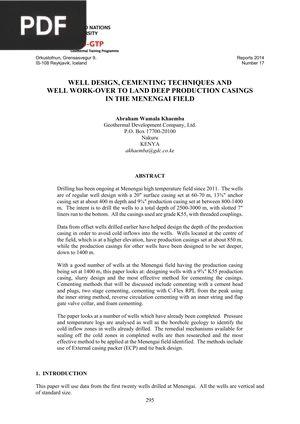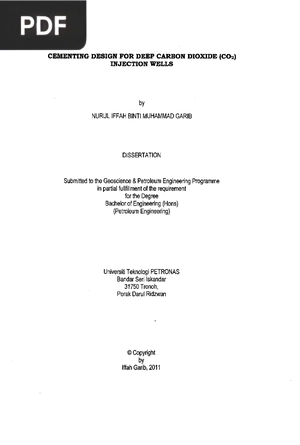Biocementation as a Pro-Ecological Method of Stabilizing Construction Subsoil
Author: MDPI
*Wait a few seconds for the document to load, the time may vary depending on your internet connection. If you prefer, you can download the file by clicking on the link below.
Information
Description: Biocementation as a Pro-Ecological Method of Stabilizing Construction Subsoil por MDPI explores sustainable alternatives to traditional cementation for soil stabilization. It highlights the use of microorganisms to enhance soil shear strength, offering an environmentally friendly approach for construction subsoil improvement.
Pages: 15
Megabytes: 0.65 MB
This may interest you
Well design, cementing techniques and well work-over to land deep production casings in the menengai field
Extension: PDF | 30 pages
Well design, cementing techniques and well work-over to land deep production casings in the menengai field por Abraham Wamala Khaemba presents a case study from the Menengai geothermal field, detailing well design, cementing strategies, and workover procedures. This valuable resource provides insights into optimizing well integrity and productivity in geothermal environments, making it a recommended read for those involved in geothermal engineering.
Cementing design for deep carbon dioxide (c02) injection wells
Extension: PDF | 50 pages
Cementing design for deep carbon dioxide (c02) injection wells por Nurul Iffah Binti Muhammad Garis provides insights into cement composition for CO2 injection wells. It focuses on optimizing cement slurry properties and mitigating CO2 corrosion, crucial for well integrity.
Current concepts and outcomes in cemented femoral stem design and cementation techniques – the argument for a new classification system
Extension: PDF | 13 pages
Current concepts and outcomes in cemented femoral stem design and cementation techniques: the argument for a new classification system por Adrian J. Cassar-Gheit and others describes the evolution of cemented femoral stem designs and proposes a new classification system. This paper offers a comprehensive review of designs and techniques, essential for optimizing outcomes in hip arthroplasty.









































